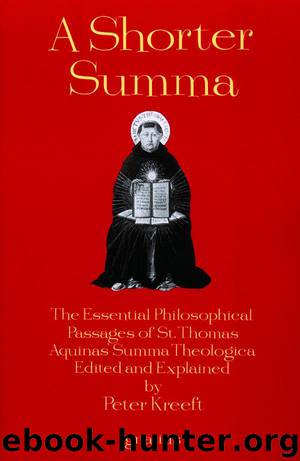A Shorter Summa by Peter Kreeft

Author:Peter Kreeft
Language: eng
Format: azw3, epub
Publisher: Ignatius Press
Published: 0101-01-01T00:00:00+00:00
QUESTION 85
Of the Mode and Order
of Understanding
FIRST ARTICLE
Whether Our Intellect Understands Corporeal and Material Things by Abstraction from Phantasms?
Objection 1. It would seem that our intellect does not understand corporeal and material things by abstraction from the phantasms. For the intellect is false if it understands an object otherwise than as it really is. Now the forms of material things do not exist as abstracted from the particular things represented by the phantasms. Therefore, if we understand material things by abstraction of the species from the phantasm, there will be error in the intellect.
Objection 2. Further, material things are those natural things which include matter in their definition. But nothing can be understood apart from that which enters into its definition. Therefore material things cannot be understood apart from matter. Now matter is the principle of individualization. Therefore material things cannot be understood by abstraction of the universal from the particular, which is the process whereby the intelligible species is abstracted from the phantasm.17. . .
On the contrary, The Philosopher says (De Anima iii. 4) that things are intelligible in proportion as they are separable from matter. Therefore material things must needs be understood according as they are abstracted from matter and from material images, namely, phantasms.
I answer that, As stated above (Q. 84, A. 7), the object of knowledge is proportionate to the power of knowledge. Now there are three grades of the cognitive powers. For one cognitive power, namely, the sense, is the act of a corporeal organ. And therefore the object of every sensitive power is a form as existing in corporeal matter. And since such matter is the principle of individuality, therefore every power of the sensitive part can only have knowledge of the individual.18 There is another grade of cognitive power which is neither the act of a corporeal organ, nor in any way connected with corporeal matter; such is the angelic intellect, the object of whose cognitive power is therefore a form existing apart from matter: for though angels know material things, yet they do not know them save in something immaterial, namely, either in themselves or in God.19 But the human intellect holds a middle place:20 for it is not the act of an organ,21 yet it is a power of the soul which is the form of the body,22 as is clear from what we have said above (Q. 76, A. 1). And therefore it is proper to it to know a form existing individually in corporeal matter, but not as existing in this individual matter.23 But to know what is in individual matter, not as existing in such matter, is to abstract the form from individual matter which is represented by the phantasms. Therefore we must needs say that our intellect understands material things by abstracting from the phantasms; and through material things thus considered we acquire some knowledge of immaterial things, just as, on the contrary, angels know material things through the immaterial.
But Plato, considering only the immateriality of the
Download
This site does not store any files on its server. We only index and link to content provided by other sites. Please contact the content providers to delete copyright contents if any and email us, we'll remove relevant links or contents immediately.
The Secret Power of Speaking God's Word by Joyce Meyer(3161)
Signature in the Cell: DNA and the Evidence for Intelligent Design by Stephen C. Meyer(3123)
Real Sex by Lauren F. Winner(3006)
The Holy Spirit by Billy Graham(2939)
The Gnostic Gospels by Pagels Elaine(2517)
Jesus by Paul Johnson(2351)
Devil, The by Almond Philip C(2324)
23:27 by H. L. Roberts(2245)
The Nativity by Geza Vermes(2226)
Chosen by God by R. C. Sproul(2159)
All Things New by John Eldredge(2156)
Angels of God: The Bible, the Church and the Heavenly Hosts by Mike Aquilina(1951)
The Return of the Gods by Erich von Daniken(1927)
Angels by Billy Graham(1920)
Knowing God by J.I. Packer(1848)
Jesus of Nazareth by Joseph Ratzinger(1802)
The Gnostic Gospel of St. Thomas by Tau Malachi(1781)
Evidence of the Afterlife by Jeffrey Long(1776)
How To Be Born Again by Billy Graham(1775)
